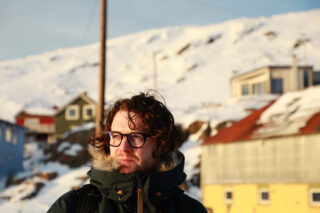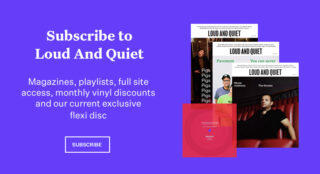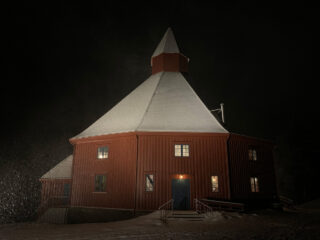Beirut: “I’m almost afraid the story is too cinematic”
Zach Condon discusses Hadsel, the Arctic country album he made in the warmth of a funeral

Zach Condon discusses Hadsel, the Arctic country album he made in the warmth of a funeral
Thunder and lightning underscore my conversation with Berlin-based composer Zach Condon; he needs headphones to hear over the rain pleading on his attic studio window. The elements performed a similar show for the Arctic cabin where he spent two dead-of-winter months crafting Hadsel, Beirut’s sixth album, named after the Norwegian municipality.
“There were a couple of hurricanes that were so brutal I thought the house was going to come down,” he reflects. With only a few sunlight hours each day, though, he lived indoors – spending endless nights zealously tinkering with five oversized suitcases’ worth of music equipment. Even the local church was at his disposal. “Oddvar would call and say, ‘Hey, we just had a funeral. The church is warm if you wanna go in there. It’s yours for the night,’” Condon explains.

“In some ways, I’m almost afraid the story is too cinematic,” he suggests. It does resemble the hero’s journey narrative: crisis prompts adventure prompts revelation (in this case, a work of experimental folk that envelopes listeners and embalms the island’s vista). “The touring in 2019 just crashed and burned,” Condon says, detailing the inciting incident. “I was feeling like I’d failed. I sent a lot of people home empty-handed – fans and my fellow bandmates.” This period was exacerbated by Condon’s nascent sobriety. “From the age of 15, I drowned everything in alcohol,” he shares, adding an analogy: “[When you] take a drink, every time you finish, you throw it in the backseat of a car as you’re speeding down the street. When you slam the brakes – which is getting sober – all of it comes to hit you in the back of the head.”
So when his partner floated Hadsel, “it represented everything I wanted as far as shelter and warmth and comfort, as well as an escape from civilisation and from my life, my reality,” he explains. The ensuing sojourn was Condon’s most prolific creative period since aged 15: “You don’t have any inner critics anymore because you’re just in awe, and you’re just amazed, a brand new mind again. My mind in that state can spit out a lot of expressive ideas.”
These ideas were brought to life by the pump organ idling in a corner of the cabin, which he introduced to his tried and true companions: the funereal French Horn, a gatherum of vintage synthesisers, and his favoured ukulele. The latter – a baritone uke, which sounds a little like an acoustic guitar – served to channel a newfound interest: country music. “My partner was like, ‘You can’t just blast Arabic music all day in this cosy cabin; it doesn’t fit,’” he recalls. “‘What about country? That’s kind of mellow and warm.’
“We put on a Hank Williams record and that knocked something loose in me. It was like all my pretensions just fell away. Then I started listening to everything […] it was all these guys being like, ‘I’m lonely; I’ve got a drinking problem,’ and they’re so honest and almost ridiculously baron.”

Those familiar with Beirut understand why Condon’s lived 30-some years without country music. He told Loud And Quiet back in 2015: “If I could change one thing in this world, music wouldn’t have words.” And his lyrics are usually plucked from the atmosphere seconds before hitting record. “[First takes] are the most jam-packed with feeling,” he says, “and every take after that loses a little more. So I’ve often left those [lyrics] in, and people have asked me, ‘What does it mean? I’m sorry but I don’t really know either.’”
Though not a full U-turn, Condon admits that Hank made him realise, “Well, if these are lyrics, then I like them.” That’s why ‘Stokmarknes’ is a diaristic account of his trip, and ‘So Many Plans’ mourns old friends but trusts they will return, and ‘The Tern’ advocates self-discovery, no matter how belated. He points to Cocteau Twins and Sigur Rós as demonstrating lyrics’ futility, but Hadsel’s poetry only deepens our investment in our hero’s journey; we have not just a reliable soundtrack but a reliable narrator, too.
And if you don’t believe me, believe Hadsel: “When I went back a few years later, I noticed that [the album lasts] the exact amount of time it takes to drive around the island. I circled the island and it was almost perfect. I was really happy about that.”